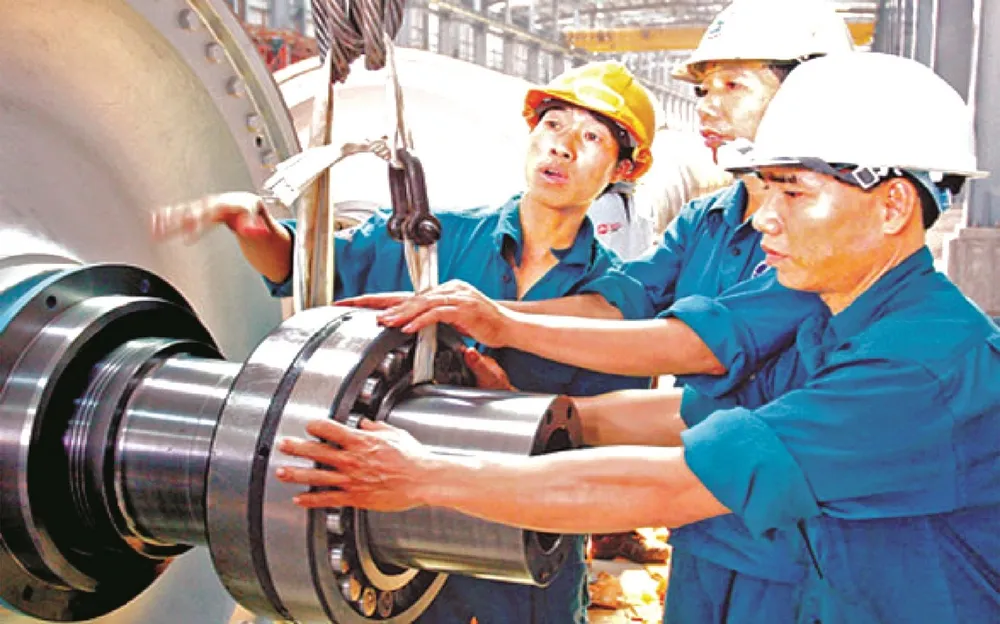
The Declining Efficiency of State Investment
Vietnam's Constitution affirms the state's leading role in the economy, but recent trends indicate a decline in state investment growth. From 2010 to 2015, state investment capital grew at an average rate of 6.34%, but by 2020-2024, this rate had dropped to just 2.6%. Moreover, the share of state investment in the economy has decreased from 44% in 2010 to 27.6% in 2024. The portion of state-owned enterprise investment in total public investment has also shrunk significantly, from 43.56% in 2010 to 34.43% in 2023.
Despite operating in essential industries with stable demand, SOEs exhibit lower investment efficiency than private enterprises and foreign direct investment (FDI). This inefficiency is reflected in the Incremental Capital-Output Ratio (ICOR), where a higher coefficient signifies lower investment efficiency. In 2023, the state sector's ICOR stood at 6.19, significantly higher than the private sector's 4.90 and FDI's 4.67.
The inefficiency of SOEs stems from rigid mechanisms governing state capital management. According to Decision No. 929/QD-TTg issued by the Prime Minister in 2012, SOEs are mandated to focus on key sectors, essential public services, and national security, limiting their ability to invest in more lucrative industries. Consequently, SOEs lack the legal framework necessary to capitalize on high-return business opportunities.
Moreover, the authority of ownership representative agencies over SOEs is fragmented and inefficient. While regulations permit direct ownership representatives to approve investments below 50% of the owner's capital, internal rules often require extensive reporting and approval processes. This bureaucratic complexity delays project implementation, increases costs, and diminishes capital efficiency.
Another major issue is the selection and management of personnel in SOEs. The recruitment of executives often follows administrative guidelines rather than market-driven criteria, resulting in leadership that may not align with business needs. Furthermore, SOE managers are subject to constrained salary and bonus structures, making it difficult to attract and retain top talent compared to the private sector.
Reforming SOEs to Drive Economic Growth
In response to these challenges, the Vietnamese government has introduced measures to revitalize SOEs. On March 21, 2025, the Prime Minister issued Directive No. 09/CT-TTg, outlining key tasks and solutions to enhance SOE contributions to national economic growth. This directive calls for bold reforms to enable SOEs to operate with greater flexibility, efficiency, and competitiveness.
To improve the effectiveness of SOEs, Vietnam must adopt a tailored legal and operational framework. This framework should include several key measures.
SOEs should be categorized based on their strategic functions. Infrastructure SOEs focus on providing essential public services and regional connectivity at reasonable costs. Public service SOEs are dedicated to education, healthcare, and culture, ensuring quality social services. Commercial SOEs compete in the market on equal terms with private enterprises, aiming to generate profits and contribute to the national budget.
Ensuring transparency and accountability is critical. The state should minimize direct intervention in SOE operations while enforcing stringent transparency measures. Financial, business, and governance information should be publicly available to stakeholders, including investors, regulatory agencies, and the general public.
Independent oversight and risk management must be strengthened. Supervisory agencies overseeing SOEs should have the authority and resources to monitor and evaluate performance effectively. A robust risk management framework should be established to delineate responsibility levels. If managers comply with risk protocols but encounter unforeseen financial losses, they should be exempt from personal liability.
The government should clearly define which sectors require continued state investment and which should be divested. Priority should be given to sectors critical for national security and public welfare, while non-essential sectors should be gradually privatized. Encouraging innovation and market adaptation is equally important. SOEs must be empowered to innovate and adapt to market trends, including investments in emerging technologies, digital transformation, and global supply chains. Collaboration with private enterprises and foreign investors can enhance efficiency and competitiveness.
A competitive compensation structure is essential for attracting and retaining top talent. SOEs should be allowed greater flexibility in determining executive compensation to align with market standards. Performance-based incentives can drive efficiency and accountability.
An essential aspect of SOE reform is leadership and workforce development. SOE executives and key personnel should be selected based on market principles rather than bureaucratic practices. The adoption of merit-based recruitment and promotion processes can ensure that individuals with the right expertise and vision lead SOEs.
Additionally, training programs should be established to equip SOE employees with modern management skills, digital competencies, and international business knowledge. By fostering a high-performing workforce, SOEs can operate more effectively in competitive global markets.
Vietnamese SOEs should actively integrate into global supply chains and international markets. Strategic partnerships with multinational corporations, joint ventures, and foreign investments can help SOEs leverage advanced technologies and best practices.
Expanding into foreign markets can also diversify revenue streams and reduce dependence on domestic economic fluctuations. To achieve this, SOEs need greater autonomy in decision-making, allowing them to seize international business opportunities swiftly and efficiently.
Vietnam's SOEs are at a crossroads. While they hold significant potential to drive economic growth, systemic inefficiencies and regulatory constraints hinder their performance. By redefining their role, enhancing transparency, implementing independent oversight, and strategically managing state capital, Vietnam can transform its SOEs into dynamic and competitive enterprises. These reforms will not only improve investment efficiency but also contribute to the country's broader economic development goals.
A long-term commitment to restructuring SOEs will help Vietnam achieve sustainable economic growth, enhance global competitiveness, and improve public sector governance. The government's willingness to implement meaningful reforms will determine the success of these efforts in the coming years. If executed effectively, Vietnam's SOEs can become a model for state-led economic transformation in the region, ensuring that state investment capital is utilized efficiently and productively.




















